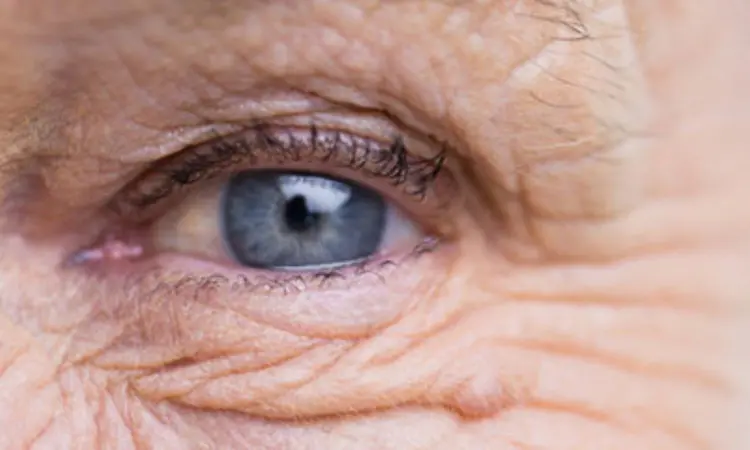- Home
- Medical news & Guidelines
- Anesthesiology
- Cardiology and CTVS
- Critical Care
- Dentistry
- Dermatology
- Diabetes and Endocrinology
- ENT
- Gastroenterology
- Medicine
- Nephrology
- Neurology
- Obstretics-Gynaecology
- Oncology
- Ophthalmology
- Orthopaedics
- Pediatrics-Neonatology
- Psychiatry
- Pulmonology
- Radiology
- Surgery
- Urology
- Laboratory Medicine
- Diet
- Nursing
- Paramedical
- Physiotherapy
- Health news
- Fact Check
- Bone Health Fact Check
- Brain Health Fact Check
- Cancer Related Fact Check
- Child Care Fact Check
- Dental and oral health fact check
- Diabetes and metabolic health fact check
- Diet and Nutrition Fact Check
- Eye and ENT Care Fact Check
- Fitness fact check
- Gut health fact check
- Heart health fact check
- Kidney health fact check
- Medical education fact check
- Men's health fact check
- Respiratory fact check
- Skin and hair care fact check
- Vaccine and Immunization fact check
- Women's health fact check
- AYUSH
- State News
- Andaman and Nicobar Islands
- Andhra Pradesh
- Arunachal Pradesh
- Assam
- Bihar
- Chandigarh
- Chattisgarh
- Dadra and Nagar Haveli
- Daman and Diu
- Delhi
- Goa
- Gujarat
- Haryana
- Himachal Pradesh
- Jammu & Kashmir
- Jharkhand
- Karnataka
- Kerala
- Ladakh
- Lakshadweep
- Madhya Pradesh
- Maharashtra
- Manipur
- Meghalaya
- Mizoram
- Nagaland
- Odisha
- Puducherry
- Punjab
- Rajasthan
- Sikkim
- Tamil Nadu
- Telangana
- Tripura
- Uttar Pradesh
- Uttrakhand
- West Bengal
- Medical Education
- Industry
Early blood glucose management may prevent macular degeneration in patients with diabetes

South Korea: A recent study published in Diabetes & Metabolism has reported an increased incidence of dry and wet age-related macular degeneration (AMD) in diabetes patients compared to those with normal glycemic status.
Wet AMD's risk increased among patients with new-onset diabetes. An increase was noted in these risks (wet and dry AMD) when the diabetes duration was five years or more. While emphasizing the importance of early blood glucose management, the nationwide population-based cohort study findings suggest high blood glucose levels without treatment might lead to the vision-threatening condition of wet AMD.
Age‐related macular degeneration (AMD) is the common cause of irreversible blindness due to progressive loss of central vision among older adults and affects quality of life. AMD is categorized into wet (exudative/neovascular) and dry (nonexudative). Dry AMD is characterized by the accumulation of extracellular deposits (drusen) and geographic atrophy of the RPE (retinal pigment epithelium) and photoreceptors; wet AMD is characterized by choroidal neovascularization (CNV) and subsequent repeated instances of retinal exudation and haemorrhage leading to rapid vision loss. In most cases, AMD starts as the dry type; however, 10–20% of cases advance to wet AMD.
Hyungwoo Lee, Konkuk University School of Medicine, Seoul, Republic of Korea, and colleagues investigated the risk of dry and wet AMD based on disease duration of type 2 diabetes and fasting glucose levels in a retrospective, population-based cohort study.
For this purpose, the researchers conducted a study of 2,103,604 adults ≥ 45 years of age who were AMD-free using the health examinations and health insurance claims database results in South Korea. Glycemic status was divided into five groups: new-onset diabetes, diabetes ≥ 5 years, diabetes diagnosis < 5 years, and normal, impaired fasting glucose. AMD was classified as dry and wet AMD according to the absence and presence of choroidal neovascularization, respectively. In each category, adjusted hazard ratios (HRs) of AMD occurrence were estimated.
The study led to the following findings:
- For dry AMD (n = 36,271, 1.72%), the HR was 1.192 among people with diabetes < 5 years and 1.294 among people with diabetes ≥ 5 years compared with people with normal blood sugar status after adjusting for sex, age, lifestyle, body mass index, and medical history.
- The HR was 1.103 for wet AMD (n = 12,912, 0.61%) among subjects with new-onset diabetes, 1.252 in people with diabetes < 5 years, and 1.506 among people with diabetes ≥ 5 years.
- There was a significant increase in the HR of AMD among participants ≤ 65 years old and those who did not have hypertension.
The study found an association between the glycemic status of the participants and dry and wet AMD incidence.
"Compared with subjects with normal glycemic status, the AMD risk increased with increased glycemic status and longer diabetes duration," the researchers wrote. "Also, a significant increase in wet AMD risk was seen among new-onset diabetes patients."
Reference:
Lee, H., Han, K., & Shin, J. (2023). Association between glycemic status and age-related macular degeneration: A nationwide population-based cohort study. Diabetes & Metabolism, 49(3), 101442. https://doi.org/10.1016/j.diabet.2023.101442
Dr Kamal Kant Kohli-MBBS, DTCD- a chest specialist with more than 30 years of practice and a flair for writing clinical articles, Dr Kamal Kant Kohli joined Medical Dialogues as a Chief Editor of Medical News. Besides writing articles, as an editor, he proofreads and verifies all the medical content published on Medical Dialogues including those coming from journals, studies,medical conferences,guidelines etc. Email: drkohli@medicaldialogues.in. Contact no. 011-43720751


